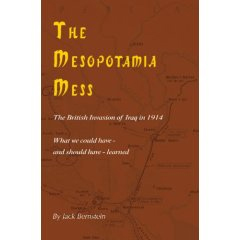The Story of the First War in The Middle East over Oil
Book Review

(Redondo Beach, CA, February 11, 2008) In 1914, the British invaded Mesopotamia (now called Iraq) to protect their oil interests in the region. What began as a limited military initiative, with no expectation for occupation, resulted in over four decades of active political and military involvement, including the battling of a 12-year insurgency.
The Mesopotamia Mess, a 245 page paperback book chronicling the events before, during, and after the invasion, has just been released by InterLingua Publishing. A description of the book can be found at www. TheMesopotamiaMess.com.
"The similarities between the British invasion and occupation in 1914, and the current U.S. experience are remarkable," says Jack Bernstein, the author/editor of the book. "There were many, many lessons that U.S. politicians and military could have - and should have - learned before the 2003 invasion."
As soon as the hostilities ceased in both wars, wide scale looting occurred, and neither the British in 1914 nor the U.S. in 2003 appreciated the deep divide between the religious sects, nor their willingness to resort to violence to resolve their differences. The governments of both generations expected that once the yoke of oppression was lifted from their shoulders, the people of Iraq would focus on building a new future, and not settling old scores. Both the British then and the U.S. now shared a vision of the three communities of Iraq working together as a single nation, but only found a dysfunctional civil administration and little interest in comingling of cultures under one rule. Both governments accepted their roles as "peace keepers" protecting the people, but the local population chose to fight their "occupiers" with bloody insurgencies. Both the British and the U.S. expected more assistance from their allies than they received, and sadly, both were completely unprepared for the enormous financial investment that had to be made, and the terrible cost in human lives, resulting from their invasions.
Some quotes from the book speak to the lessons that could have been learned:
"The British cobbled three disparate vilayets (Basra, Baghdad, and Mosul) together to take full advantage of Iraq's strategic and economic potential. To ensure this contrived nation remained intact and continued to do its bidding, the British installed a ruler they could influence; formulated a national-level governmental structure to ensure its dominance; and established a security apparatus dependent on its support."
"Mesopotamia is inhabited solely by Arab tribes, and the Arabs are all Mohammedans. The Mohammedans of the world are divided into two main sects by irreconcilable differences of religious opinion; sects which in Mesopotamia have indulged in innumerable fearful contests for supremacy, all of which have tended to sink the country further and further into moral ruin and material exhaustion."
"Parliament seriously discussed evacuating Iraq but Sir Percy Cox, High Commissioner, argued that British 'policy in Iraq was working, would bear dividends great enough to justify its continuance, and if prematurely curtailed, would be disastrous, and withdrawal would lead to anarchy."
"The irony, to me, as an American, is that most of the information used in this book was made available from the online libraries of U.S. and British military," says Bernstein. "I wish I believed that the architects of our current strategy in Iraq spent a few hours on the internet researching the history of the region before they decided to invade it."
InterLingua Publishing is a 17-year-old Southern California-based company specializing in the publishing of materials that have "an international flavour," including those that require translation between English and 150 foreign languages. Interlingua's books, CD's, and mp3 audio programs are used by professionals, academics, and students in a broad spectrum of endeavours.
For more information contact:
Jack Bernstein
phone: 310/792-3637
fax: 310/792-3642
TheMesopotamiaMess@gmail.com

